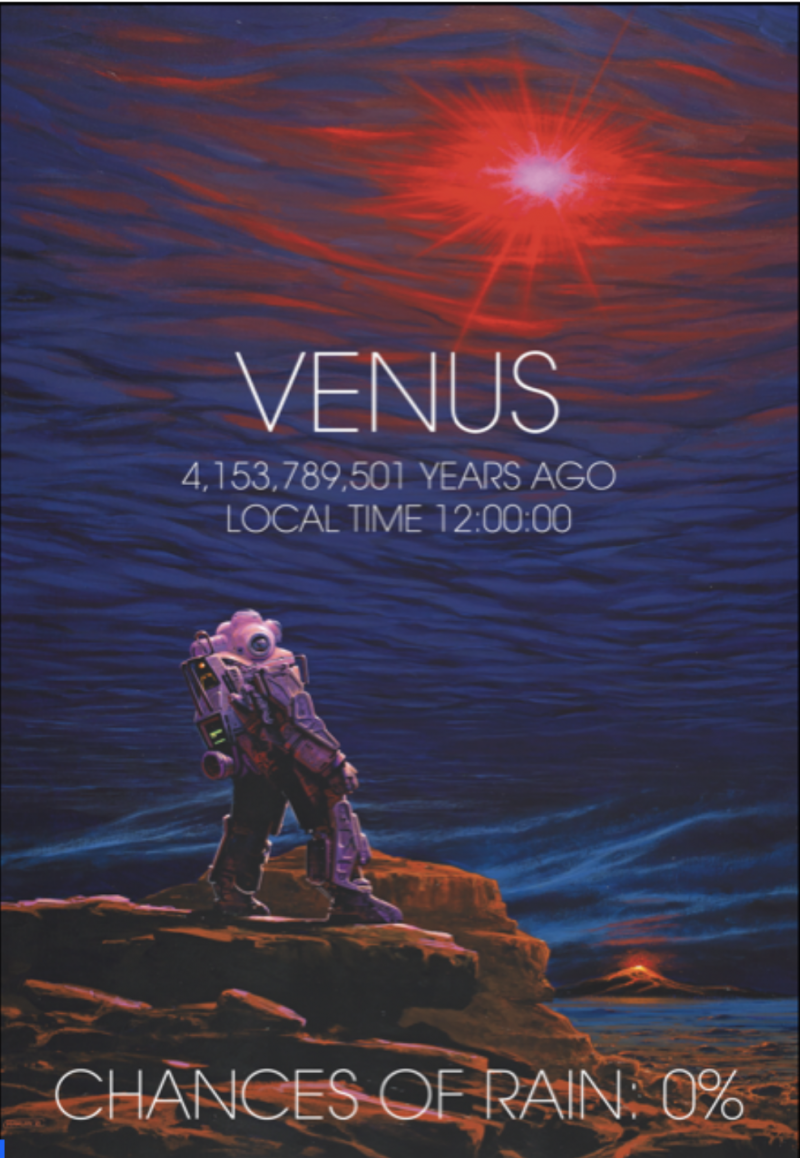
Venus never had oceans?
Were there once oceans on Venus, or not? That’s a big question, because the existence of oceans on Earth’s nearest neighbor would suggest the possibility of life. While some scientists do believe that Venus might have had oceans in the past, a new study disagrees. A team of scientists announced on October 13, 2021, that their computer models show that Venus lacked oceans from the beginning.
The peer-reviewed journal Nature published this study on October 13. The scientists, from the University of Geneva and French National Centre for Scientific Research, used a state-of-the-art climate model to reach their conclusions.
These scientists’ work indicates that conditions were never right for rain to fall on Venus, and so for oceans to form.
Venus itself formed 4.5 billion years ago along with the sun, Earth and the rest of our solar system. Like the young Earth, the young Venus was likely covered with magma, or molten rock. But before water could fall as rain, the planet and its atmosphere would have had to cool. If rain did fall, as happened on Earth, it would have taken several thousand years to accumulate into oceans.
In the early days of the solar system, the sun was 30 percent fainter than it is now. Despite the smaller amount of solar radiation striking the young Venus, the new study suggests the planet would still have been too hot to allow oceans to form. Clouds might have made a difference if they were thick enough to block the sun and reduce temperatures. Clouds could have provided a buffer to allow the temperature near Venus’ surface to drop.
But the new study, based on computer modeling, makes that scenario unlikely. The study shows that clouds would indeed have formed on the night side of Venus. But the planet’s day side would still have been exposed to sunlight. Venus has a slow rotation, with its day nearly equaling its year. According to this new work, the clouds on Venus didn’t shield the planet from the sun – or cool it sufficiently for rain to fall – even as those clouds were beginning to trap heat near Venus’ surface, creating the runaway greenhouse effect that makes Venus’ surface hot enough today to melt lead.
According to these scientists, high surface temperatures would have meant water in a gaseous state only near Venus’ surface. Hence, no rain and no oceans.

Comparing Venus and Earth
The scientists are trying to learn both about early Venus’ and early Earth’s atmospheres. Lead scientist Martin Turbet of the University of Geneva summed up:
We simulated the climate of the Earth and Venus at the very beginning of their evolution, more than 4 billion years ago, when the surface of the planets was still molten. The associated high temperatures meant that any water would have been present in the form of steam, as in a gigantic pressure cooker.
According to these scientists’ computer models, Earth barely escaped the same fate as Venus. Were it closer to the sun or were the sun as hot then as it is today, Earth might also have had water in the form of steam only. Turbet continued:
Thanks to our simulations, we were able to show that the climatic conditions did not allow water vapor to condense in the atmosphere of Venus. One of the main reasons for this is the clouds that form preferentially on the night side of the planet. These clouds cause a very powerful greenhouse effect that prevented Venus from cooling as quickly as previously thought.
Emeline Bolmont of the University of Geneva explained how their new view of the early planets’ atmospheres changes the way we see our own planet:
This is a complete reversal in the way we look at what has long been called the Faint Young Sun paradox. It has always been considered as a major obstacle to the appearance of life on Earth! [The argument was that if the sun’s radiation was much weaker than today, it would have turned the Earth into a ball of ice hostile to life.] But it turns out that for the young, very hot Earth, this weak sun may have in fact been an unhoped-for opportunity.
Future missions to Venus
So who is right? The previous studies that showed Venus could have been watery, or the new simulations that say “not a chance?” The scientists hope that future missions will reveal whether their models are correct or not.
David Ehrenreich of the University of Geneva said:
Our results are based on theoretical models and are an important building-block in answering the question of the history of Venus. But we will not be able to rule on the matter definitively on our computers. The observations of the three future Venusian space missions will be essential to confirm – or refute – our work.

Bottom line: Scientists have run computer simulations that suggest Venus never had oceans because the conditions were never cool enough to allow for rain.
Source: Day–night cloud asymmetry prevents early oceans on Venus but not on Earth











